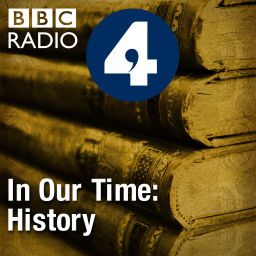
by BBC World Service
<p>The programme that explains the present by exploring the past.</p>
Language
🇺🇲
Publishing Since
3/30/2016
Email Addresses
1 available
Phone Numbers
0 available

April 19, 2025
<p>Airports: at their most basic level places to fly from to reach destinations near and far. And yet so much more. Iszi Lawrence and guests take a look at the evolution of airports, from their beginnings as military airstrips to the modern-day behemoths with their luxury shopping outlets, gardens and art galleries.</p><p>The early European airports were modelled on railway stations, as that was the only blueprint for a transport hub. The public became so enthralled by air travel that airports eventually became popular as destinations in themselves. Airports today are places filled with emotion: the scene of farewells and arrivals, as well as the stress of international travel in an age of terrorism.</p><p>Iszi is joined by cultural historian Alastair Gordon, author of Naked Airport: A Cultural History of the World’s Most Revolutionary Structure; Lilia Mironov, an architectural historian and air steward who wrote Airport Aura: A Spatial History of Airport Infrastructure; and architect and airport planner Su Jayaraman who teaches at the University of Westminster in London. Plus a range of Forum listeners from around the world contribute their personal experiences of airports.</p><p>Produced by Fiona Clampin for BBC World Service.</p><p>(Photo: John F. Kennedy International Airport, the TWA Flight Center, terminal 5, designed by Eero Saarinen. Credit: Lehnartz/ullstein bild/Getty Images)</p>

March 15, 2025
<p>What is the purpose of libraries in the era of the internet and AI? Whether at a school or in a community, libraries used to be key providers of information and enjoyment for many. But now, in a digital age, more books and periodicals are available online than even the biggest library can hold. If terabytes of text can now be stored on a single laptop, do we need to think differently about the way we access and navigate books? Could well-designed AI tools be trusted to make sense of this information abundance in a similar way that a good librarian can?</p><p>Rajan Datar discusses the past, present and future of libraries with Randa Chidiac, Director of Library Services at the American University in Dubai; Dr. Andrew Hui, Head of Literature Studies at Yale-NUS College in Singapore; and Brewster Kahle, computer engineer and digital librarian, founder of the Internet Archive and Wayback Machine. We also hear from World Service listeners.</p><p>(Photo: An artist's impression of a digital book. Credit: Alengo/Getty Images)</p>

February 15, 2025
<p>From Colombia to Vietnam and beyond the US dollar is the currency in which much of international business is conducted and which many people outside the US use as a means of exchange and a store of value. So how did a country with just over 4 percent of the world’s population come to dominate global banking and trade? When the position of the US dollar as the linchpin of global commerce was confirmed at the end of the Second World War, not everyone was happy with this state of affairs: the French soon spoke of the Americans having an ‘exorbitant privilege’. Did they have a point? And what of the more recent efforts to replace the Greenback with other currencies? Iszi Lawrence follows the history of the US dollar from its origins to today with H W Brands Jr., Professor of history at the University of Texas at Austin; Barry Eichengreen, Professor of economics and political science at the University of California, Berkeley; Carola Frydman, Professor of finance at the Kellogg School of Management, Northwestern University in Evanston; Perry Mehrling, Professor of international political economy at the Pardee School of Global Studies, Boston University and World Service listeners.</p><p>[Photo: A roll of US dollar notes. Credit: Getty Images]</p>

BBC Radio 4

BBC Radio 4

BBC Radio 4

BBC World Service

BBC Radio 4

BBC Radio 4

BBC Radio 4

BBC Radio 4

BBC World Service

BBC Radio 4

BBC Radio 4

BBC Radio 4

BBC World Service

BBC World Service
Pod Engine is not affiliated with, endorsed by, or officially connected with any of the podcasts displayed on this platform. We operate independently as a podcast discovery and analytics service.
All podcast artwork, thumbnails, and content displayed on this page are the property of their respective owners and are protected by applicable copyright laws. This includes, but is not limited to, podcast cover art, episode artwork, show descriptions, episode titles, transcripts, audio snippets, and any other content originating from the podcast creators or their licensors.
We display this content under fair use principles and/or implied license for the purpose of podcast discovery, information, and commentary. We make no claim of ownership over any podcast content, artwork, or related materials shown on this platform. All trademarks, service marks, and trade names are the property of their respective owners.
While we strive to ensure all content usage is properly authorized, if you are a rights holder and believe your content is being used inappropriately or without proper authorization, please contact us immediately at [email protected] for prompt review and appropriate action, which may include content removal or proper attribution.
By accessing and using this platform, you acknowledge and agree to respect all applicable copyright laws and intellectual property rights of content owners. Any unauthorized reproduction, distribution, or commercial use of the content displayed on this platform is strictly prohibited.